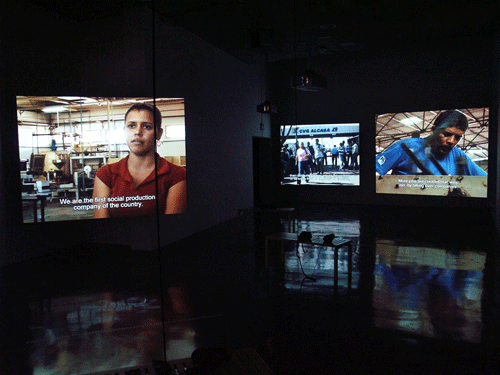- Database
- Venezuela
- 01.01.2006
- NETWORKED CULTURES
5 Factories – Worker Control in Venezuela
In their second film regarding political and social change in Venezuela, after “Venezuela from Below” (67 min., 2004), Azzellini and Ressler focus on the industrial sector in “5 Factories–Worker Control in Venezuela“. The changes in Venezuela’s productive sphere are demonstrated with five large companies in various regions: a textile company, aluminum works, a tomato factory, a cocoa factory, and a paper factory. In all, the workers are struggling for different forms of co- or self-management supported by credits from the government. “The assembly is basically governing the company”, says Rigoberto López from the textile factory “Textileros del Táchira” in front of steaming tubs. And coning machine operator Carmen Ortiz summarizes the experience as follows: “Working collectively is much better than working for another–working for another is like being a slave to that other”.
The protagonists portrayed at the five production locations present insights into ways of alternative organizing and models of workers’ control. Mechanisms and difficulties of self-organization are explained as well as the production processes. The portrayal of machine processes could be seen as a metaphor for the dream machine of the “Bolivarian process”, and the hopes and desires it inspires among the workers. The situation in the five factories varies, but they share the common search for better models of production and life. This not only means concrete improvements for the workers. Aury Arocha, laboratory analyst at the ketchup factory “Tomates Guárico”, emphasizes that the difference between “social production companies” (EPS) and capitalist corporations is that the EPS “work for the community and society”. Carlos Lanz, president of the second largest aluminum factory in Venezuela, Alcasa, coins the key question: “How does a company push toward socialism within a capitalist framework?”
The film ends with an extended sequence from a management meeting at Alcasa, a company with 2.700 workers, with discussions about co-management and the changes of production relations they aspire towards.
The film is originally in Spanish and available with German or English subtitles.
The English version “5 Factories–Worker Control in Venezuela” as an installation version with six video projections from March 26 to May 28, 2006 opened the MATRIX cycle “Now-Time Venezuela: Media Along the Path of the Bolivarian Process” at the Berkeley Art Museum (U.S.A.), organized by Chris Gilbert.
Concept, interviews, film editing, production: Dario Azzellini & Oliver Ressler
Camera: Volkmar Geiblinger
Production Assistant in Venezuela: Eduardo Daza
Image editing and titles: Markus Koessl
Sound Editor: Rudi Gottsberger
Interviewees: José Luis Acosta, Luis Alfonso, Luis Alvarez, Aury Arocha, Zulay Boyer, Carolina Chacón, Eleuterio Córdova, Hugo Favero, Manrique Gonzales, Dulfo Guerrero, Rowan Jiménez, Carlos Lanz, Marivit Lopez, Rigoberto López, Willys Lugo, Gonzalo Maestre, Luis Mata Castillo, Domingo Meléndez, Edith Mendoza, José Gregorio Moy, Carmen Ortíz, Alexander Patiño, Santos Pérez, Juana Ruíz, Elio Sayago, José del Carmen Tapias, Leslie E. Turmero
